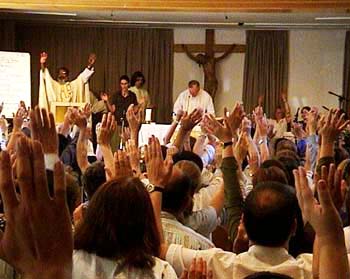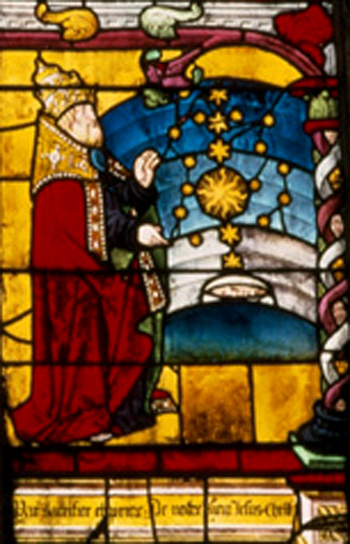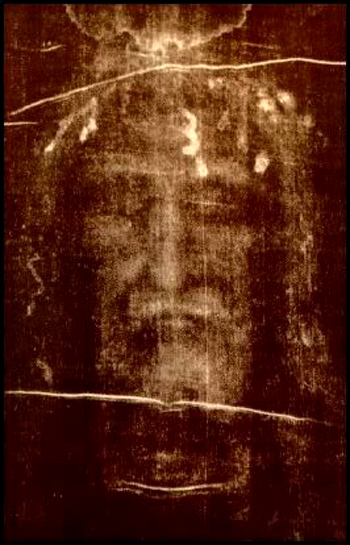Faith under Attack
 |
 |
 |
 |
 |
 |
 |
Progressivist Strategy - Part III
The Progressivist Rule of ‘Religious Sentiment’
We continue with some of the dominant ideas of the “only allowed thinking” imposed by Progressivism in the Catholic Church after Vatican II.
9. Religious faith is a sentiment, something internal to each man, a personal experience. Just as we should believe only in the person of Jesus, so also we should set aside the doctrines and anathemas of obsolete structures and forms.
This doctrine is false. It is the nucleus of Modernism condemned by St. Pius X in the Encyclical Pascendi. Quoting Vatican I, St. Pius X repeated that if anyone says that “men should be drawn to the faith only by their personal internal experience or by private inspiration, let him be anathema.” (n. 6)
 In the anti-modernist oath that every clergy and seminarian had to take by a mandate of St. Pius X, each one said:
In the anti-modernist oath that every clergy and seminarian had to take by a mandate of St. Pius X, each one said:
“I sustain with all certainty and sincerely profess that faith is not a blind religious sentiment welling up from the depths of the subconscious under the impulse of the heart and the motion of a will trained to morals, but faith is a genuine assent of the intellect to truth received by the ear. By this assent, we believe as truth that which has been attested to and revealed by a personal God, our Creator and Lord. We believe this by the authority of God, which is true to the supreme degree.” (Denzinger 2145)
The obligation to take this oath was abolished by Paul VI in 1967. Therefore, of all those who were ordained before this date and took this oath, the great majority are perjurers. Those ordained after that date – who did not take the oath and thus are not perjurers – are, notwithstanding, heretics since they have changed the very foundation and boundaries of the Faith.
What is more, until Vatican II, the modernist-progressivists were cautious, but now they act with an astonishing boldness. For example, before the Council the modernist-progressivists had to appear to follow what St. Pius X set out in his Encyclical; that is, they were obliged to acknowledge some value to Church dogmas and would say they were necessary “instruments” of religious sentiment, even though they must be continuously adapted to this sentiment that evolves with the times following the evolution of the secular world.
For them, the dogmas were “precarious,” “mutable” and “derived from life experience.” They inculcated this spirit in the principal and more modern conciliar Declarations of the ‘60s.
Today, however, the progressivists seem to have simply thrown aside dogmas. Proof of this is that the traditional catechism is no longer taught with its classical questions and answers. Instead, one “gives catechesis,” which consists in raising the “religious sentiment” of the catechumens. I recall a catechist about 40 years ago who, in his first “class,” asked the children to draw how they imagined God to be!
 Some 10 years ago, I attentively read the “catechesis” book obligatory for a junior high school run by nuns. It stated that the Adam and Eve story, like that of the creation of the world, were just mythological legends. Such atrocities resulted from the “symbolic” interpretation of Sacred Scriptures. That catechesis book, which I was told was the obligatory text in all religious schools, had the Imprimatur and Nihil Obstat of a Bishop.
Some 10 years ago, I attentively read the “catechesis” book obligatory for a junior high school run by nuns. It stated that the Adam and Eve story, like that of the creation of the world, were just mythological legends. Such atrocities resulted from the “symbolic” interpretation of Sacred Scriptures. That catechesis book, which I was told was the obligatory text in all religious schools, had the Imprimatur and Nihil Obstat of a Bishop.
These nefarious modernist-progressivist ideas result in the thinking that, if religion is the fruit of unbridled sentiments, then religion itself has no rules or valid criterion to distinguish the true religion – the Catholic religion – from the false ones.
The progressivists may respond that they differ from the others because they “love the crucified Christ.” But who is this Jesus they “love”? It is a Jesus molded by their personal sentiments and “vital immanence.” This person has nothing to do with Our Lord Jesus Christ, true God and true Man, whose teachings the progressivists reject when they do not concur with their feelings.
Further, if indeed they “feel” Him crucified, how can they ignore - in their unrestrained ecumenism with its preference for the Jews – those who crucified Him and the reasons why they did so?
By identifying Christ with a man wearing a perpetual, naive and optimistic smile, they falsify Him. Doubtlessly, Our Lord would have smiled more than once when a child would have approached Him, although the Gospel does not tell us this. Those fleeting, affectionate smiles were not, however, the legacy He gave us as to what is most characteristic of His Person.
 Instead, He left us a picture of One with a combative seriousness wholly convinced of His redemptive mission, of One in combat with the synagogue that rejected Him, as reported in the Gospels, principally in St. John’s, which is an epic history of our salvation. His divine Face, miraculously imprinted on the Sacred Shroud, is a moving display of this supreme seriousness.
Instead, He left us a picture of One with a combative seriousness wholly convinced of His redemptive mission, of One in combat with the synagogue that rejected Him, as reported in the Gospels, principally in St. John’s, which is an epic history of our salvation. His divine Face, miraculously imprinted on the Sacred Shroud, is a moving display of this supreme seriousness.
The progressivist conveniently forgets the counsels of Our Lord such as this: “If the world hate you, know ye, that it hath hated Me before you. If you had been of the world, the world would love its own: but because you are not of the world, but I have chosen you out of the world, therefore the world hateth you.
“Remember My word that I said to you: The servant is not greater than his master. If they have persecuted Me, they will also persecute you: if they have kept My word, they will keep yours also. But all these things they will do to you for My name’s sake: because they know not Him who sent me. If I had not come, and spoken to them, they would not have sin; but now they have no excuse for their sin.
“He that hateth Me, hateth My Father also. If I had not done among them the works that no other man hath done, they would not have sin; but now they have both seen and hated both Me and My Father.” (Jn 15:18-25)
This excerpt – like so many others in the Gospels, especially in St. John – causes repugnance to the progressivists. Such phrases do not correspond to the “Jesus” they fabricated and that they, unfortunately, spread throughout the Church. They dare not deny these phrases, but they just ignore them.
For this reason, their sermons, talks and words are seeping with a false piety toward a “Jesus” who is not authentic. Instead of helping to sanctify the souls of the faithful, they deform them and lead them astray from God.
Their message implies that there is no Heaven, and, above all, that there is no Hell. Even sin can be considered “marvelous” because it allows us to “feel saved.”
 The solemn cult, the magnificence of churches, the honor paid to holy orders, and above all to the See of Peter, to them seem scandalous or, at the least, dispensable.
The solemn cult, the magnificence of churches, the honor paid to holy orders, and above all to the See of Peter, to them seem scandalous or, at the least, dispensable.
This is the logic of a religion based on sentiment and “vital immanence.” It does not need manifestations of external adoration, which supposedly offend against poverty. Poverty is the only form of external display admitted by a religion that does not adore the true God but is a fabrication of the human psychology.
Further, the progressivists consider it false that the Church be considered “militant.” There is no such a thing as a Church that combats the world, the flesh and the Devil to save souls. Rather, we have a Church that follows the world in its constant evolution and adapts herself to the demands of the flesh, even those which were formerly considered “against nature.”
What the progressivists call “demons” are the negative feelings inside man without affirming that there is an angel – a personal being – who fell from Heaven to Hell and who assaults souls to draw them to his abyss of eternal fire.
Continued

This doctrine is false. It is the nucleus of Modernism condemned by St. Pius X in the Encyclical Pascendi. Quoting Vatican I, St. Pius X repeated that if anyone says that “men should be drawn to the faith only by their personal internal experience or by private inspiration, let him be anathema.” (n. 6)

Pentecostal Catholics moved by sentimental feelings, not principles, at a Novus Ordo Mass
“I sustain with all certainty and sincerely profess that faith is not a blind religious sentiment welling up from the depths of the subconscious under the impulse of the heart and the motion of a will trained to morals, but faith is a genuine assent of the intellect to truth received by the ear. By this assent, we believe as truth that which has been attested to and revealed by a personal God, our Creator and Lord. We believe this by the authority of God, which is true to the supreme degree.” (Denzinger 2145)
The obligation to take this oath was abolished by Paul VI in 1967. Therefore, of all those who were ordained before this date and took this oath, the great majority are perjurers. Those ordained after that date – who did not take the oath and thus are not perjurers – are, notwithstanding, heretics since they have changed the very foundation and boundaries of the Faith.
What is more, until Vatican II, the modernist-progressivists were cautious, but now they act with an astonishing boldness. For example, before the Council the modernist-progressivists had to appear to follow what St. Pius X set out in his Encyclical; that is, they were obliged to acknowledge some value to Church dogmas and would say they were necessary “instruments” of religious sentiment, even though they must be continuously adapted to this sentiment that evolves with the times following the evolution of the secular world.
For them, the dogmas were “precarious,” “mutable” and “derived from life experience.” They inculcated this spirit in the principal and more modern conciliar Declarations of the ‘60s.
Today, however, the progressivists seem to have simply thrown aside dogmas. Proof of this is that the traditional catechism is no longer taught with its classical questions and answers. Instead, one “gives catechesis,” which consists in raising the “religious sentiment” of the catechumens. I recall a catechist about 40 years ago who, in his first “class,” asked the children to draw how they imagined God to be!

Today's catechesis openly denies the biblical account of how God created the world
These nefarious modernist-progressivist ideas result in the thinking that, if religion is the fruit of unbridled sentiments, then religion itself has no rules or valid criterion to distinguish the true religion – the Catholic religion – from the false ones.
The progressivists may respond that they differ from the others because they “love the crucified Christ.” But who is this Jesus they “love”? It is a Jesus molded by their personal sentiments and “vital immanence.” This person has nothing to do with Our Lord Jesus Christ, true God and true Man, whose teachings the progressivists reject when they do not concur with their feelings.
Further, if indeed they “feel” Him crucified, how can they ignore - in their unrestrained ecumenism with its preference for the Jews – those who crucified Him and the reasons why they did so?
By identifying Christ with a man wearing a perpetual, naive and optimistic smile, they falsify Him. Doubtlessly, Our Lord would have smiled more than once when a child would have approached Him, although the Gospel does not tell us this. Those fleeting, affectionate smiles were not, however, the legacy He gave us as to what is most characteristic of His Person.

The image Christ left us of Himself on the Holy Shroud is one of extreme seriousuness
The progressivist conveniently forgets the counsels of Our Lord such as this: “If the world hate you, know ye, that it hath hated Me before you. If you had been of the world, the world would love its own: but because you are not of the world, but I have chosen you out of the world, therefore the world hateth you.
“Remember My word that I said to you: The servant is not greater than his master. If they have persecuted Me, they will also persecute you: if they have kept My word, they will keep yours also. But all these things they will do to you for My name’s sake: because they know not Him who sent me. If I had not come, and spoken to them, they would not have sin; but now they have no excuse for their sin.
“He that hateth Me, hateth My Father also. If I had not done among them the works that no other man hath done, they would not have sin; but now they have both seen and hated both Me and My Father.” (Jn 15:18-25)
This excerpt – like so many others in the Gospels, especially in St. John – causes repugnance to the progressivists. Such phrases do not correspond to the “Jesus” they fabricated and that they, unfortunately, spread throughout the Church. They dare not deny these phrases, but they just ignore them.
For this reason, their sermons, talks and words are seeping with a false piety toward a “Jesus” who is not authentic. Instead of helping to sanctify the souls of the faithful, they deform them and lead them astray from God.
Their message implies that there is no Heaven, and, above all, that there is no Hell. Even sin can be considered “marvelous” because it allows us to “feel saved.”

The progressivists prefer a stripped, miserablist church like Holy Spirit Chapel in Contra Costa, California
This is the logic of a religion based on sentiment and “vital immanence.” It does not need manifestations of external adoration, which supposedly offend against poverty. Poverty is the only form of external display admitted by a religion that does not adore the true God but is a fabrication of the human psychology.
Further, the progressivists consider it false that the Church be considered “militant.” There is no such a thing as a Church that combats the world, the flesh and the Devil to save souls. Rather, we have a Church that follows the world in its constant evolution and adapts herself to the demands of the flesh, even those which were formerly considered “against nature.”
What the progressivists call “demons” are the negative feelings inside man without affirming that there is an angel – a personal being – who fell from Heaven to Hell and who assaults souls to draw them to his abyss of eternal fire.
Continued

Posted March 26, 2014
______________________
______________________











